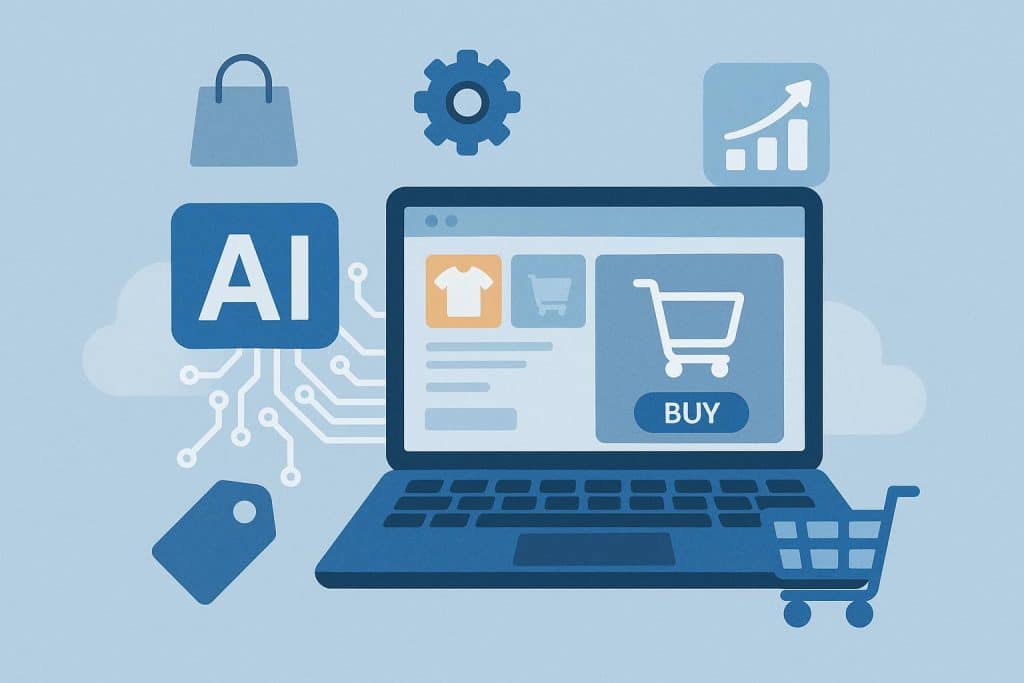The next wave of e-commerce growth isn’t coming from better ads or flashier themes — it’s coming from AI agents that can actually run parts of your business for you.
If you’re a Shopify store owner or manage a growing e-commerce brand, chances are you’ve already felt the bottlenecks: constant campaign iterations, inventory forecasting errors, missed opportunities in pricing or promotions. AI isn’t just about generating text or product images anymore — it’s about automating the repetitive operational work that slows you down.
What Are AI Agents?
Unlike simple chatbots or automation tools, AI agents are autonomous digital workers that can think and act within your business. They connect to your store, analyze real-time data, make recommendations, and can even take action — from drafting marketing campaigns to forecasting inventory needs.
Think of them as trained team members that don’t sleep, don’t miss deadlines, and learn from every task they complete.
For example, an AI agent might:
- Detect that your best-selling product is running low and draft a purchase order.
- Notice your Meta ads’ CTR has dropped and automatically test new creatives.
- Identify pricing gaps with competitors and suggest optimizations.
Why AI Agents Are a Game-Changer for Shopify Stores
Shopify merchants are in a unique position to benefit from AI-driven automation. With multiple data streams — sales, marketing, fulfillment, support — running through one ecosystem, AI can uncover inefficiencies that even experienced operators might miss.
Here’s what AI agents can unlock:
- Smarter Marketing Execution: Automatically optimize email campaigns, ads, and landing pages without waiting on freelancers or agencies.
- Real-Time Insights: Get alerts on conversion drops, underperforming SKUs, or rising ad costs before they impact profit.
- Inventory & Supply Forecasting: Predict stockouts weeks in advance and plan purchasing accordingly.
- Dynamic Pricing: Adjust prices based on margins, competitor moves, or inventory levels — in real time.
The Shift from Automation to Intelligence
Traditional automation runs on rules: If this happens, do that. AI agents, on the other hand, run on understanding and judgment. They can interpret why something happened and what’s likely to happen next.
For growing e-commerce teams, this shift means:
- Fewer repetitive tasks
- Faster decision cycles
- More accurate insights
- Higher margins and fewer mistakes
It’s like upgrading from a set of macros to a thinking, proactive operator who never stops improving.
How to Start Leveraging AI in Your Store
You don’t need to build AI infrastructure from scratch. Modern tools are now packaging agent capabilities into plug-and-play SaaS platforms.
One example is Kopa AI — an AI co-pilot built for digital commerce. It deploys specialized AI agents that automate key workflows across marketing, operations, and inventory. Instead of juggling freelancers or agencies, Kopa’s agents monitor performance, identify bottlenecks, and execute optimizations in real time.
Practical Next Steps
If you’re ready to start, here’s how to approach AI integration strategically:
- Identify repetitive processes. List what takes your team the most time (e.g., campaign setup, reporting, inventory planning).
- Automate first, optimize second. Use AI agents to execute, then train them through iteration and feedback.
- Measure ROI. Track time saved, margin improvements, and reduced dependency on external contractors.
- Stay adaptive. AI is moving fast — keep testing and integrating new agent capabilities as they evolve.
The Bottom Line
AI isn’t just a productivity hack — it’s quickly becoming the backbone of modern e-commerce operations. For Shopify brands especially, adopting AI agents early can be the difference between scaling smoothly and being left behind.
Tools like Kopa AI make that transition seamless — turning your store into a smarter, self-optimizing business that runs 24/7.
In a world where speed and efficiency define winners, the brands that leverage AI best won’t just compete — they’ll dominate.
